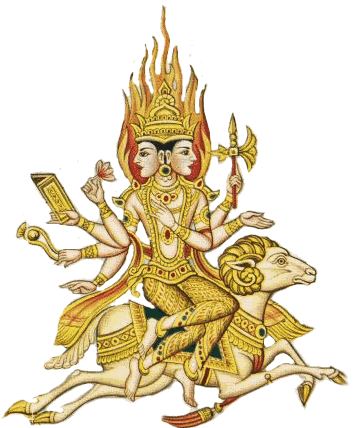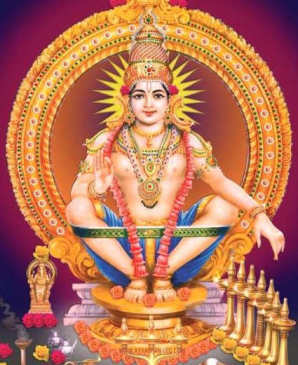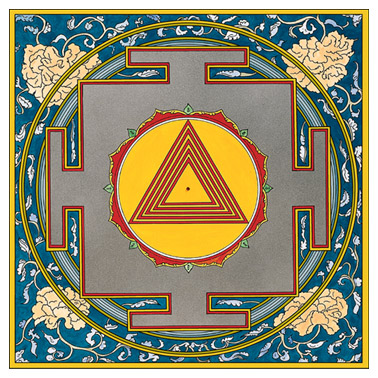
Other gods
In Hinduism, the term "other
gods" or "gods" can be understood as a kind of "organs",
"moods", or "dispositions" of One
God, and these "organs" or "moods"
have their names. The same parallel can also be found in roles attributed
to us - ask yourself how many of us are fathers, but also sons and
professionals? We, too, have multiple roles like gods. As long as
you have children and your parents still live, you are simultaneously
the son (of your parents) and the father (of your children).
Exodus 3:2, There
the angel of the Lord appeared to him in a blazing fire from the middle
of a bush. Moses stared in amazement. Though the bush was engulfed
in flames, it didn’t burn up.
Agni
Agni is the god of fire and a member of the
so-called "Dikpalas"
- a class of deities that govern specific directions (this teaching
is also in the Kalachakra tantra).
It seems that in this picture Agni has a female touch.
There are four such Guardians of Directions
called Lokapalas (Guardians of the World). These are:
Kubera - North (god of richness)
Yama - South (god of death)
Indra - East (god of war and weather)
Varuna - West (god of the oceans)
Agni is the god of southeast direction.
There are many gods in Sanatana Dharma and
most of them, except for Ganesha, Skanda, Shiva, Durga, Surya,
Vishnu (because these are considered supreme), are analogical
to the Judeo-Christian concept of "angels"
(Devas, but not so powerful as Maha Devas). Indra - god of
weather and war, for example, is the ruler of these Devas (angels).
Miscellaneous gods were considered supreme at different
times and today they are known by a completely different name. Some
of the earliest Vedic gods are: Dyaush-pita - the sky father,
Vayu - the wind god, Parjanya - the rain / thunder god,
Surya - the sun god, Varuna - the god of the oceans,
Agni - the fire god, Indra - the war or the thunder
god, Soma - the god of speech, Yama - the god of death,
Adityas - a group of solar deities, the Rig Veda recognizes
six of them, the Brahmanas recognizes eight such deities, the Satapatha
Brahmana recognizes twelve of them. The Vedic
gods are listed at the bottom.
Ahmuvan
An ancient deity worshipped in the Indus Valley
Civilization. Its image - elongated
anthropomorphic figure with three protuberances in the head -
will tell you more. This deity is associated with the Tamil god Murugan.
Ayyappa
Ayyappa is a
Hindu deity revered in South India. Lord Ayyappa is
worshipped in a number of shrines across India. The Sabarimala
Ayyappa Temple (a pilgrim centre in Kerala) is unique
in all India. Devotees of this god show no caste discrimination
if anybody wants to enter the Ayyappa temple.  Faith in this god, although with
little support in the Puranic literature, is based on legends,
which differ depending on a region they come from - their basis is
that Ayyappa is the son of Lord Shiva,
who got attracted to Lord Vishnu.
Vishnu took a female form known as Mohini.
In Srimad Bhagavatam (Bhagavata Purana) it is written (8.9.9):
"The Supreme Personality of Godhead,
in the form of Mohini, told the demons..."
Legends bring different stories, but they have one thing in common
- Lord Ayyappa is the god for all; he is Unity and Harmony.
He is also known as Bhuthanatha Dharmasastha, Hariharan, Ayyanar and
Manikanta.
Faith in this god, although with
little support in the Puranic literature, is based on legends,
which differ depending on a region they come from - their basis is
that Ayyappa is the son of Lord Shiva,
who got attracted to Lord Vishnu.
Vishnu took a female form known as Mohini.
In Srimad Bhagavatam (Bhagavata Purana) it is written (8.9.9):
"The Supreme Personality of Godhead,
in the form of Mohini, told the demons..."
Legends bring different stories, but they have one thing in common
- Lord Ayyappa is the god for all; he is Unity and Harmony.
He is also known as Bhuthanatha Dharmasastha, Hariharan, Ayyanar and
Manikanta.
Chandramouleshwar
Chandramouleshwar is the ancient form of Lord Shiva
with emphasis on the Moon (Chandra).
Dattatreya
Dattatreya is the Hindu
God who appeared as the incarnation of the Divine
Trinity - Brahma, Vishnu and
Siva. "Datta" means "Given" and the
word is derived from belief that Divine Trimurti
"gave" Themselves to a sage couple (Atri and Anasuya).
Dattatreya was a real person, but little is known about
him as a historical figure. He was the son of Atri, hence the name
"Atreya."
Madurai Veeran
Madurai Veeran (Warrior of Madurai) is a Tamil folk
deity popular in southern Tamil Nadu in India. His name was derived
as a result of his association with the City of Madurai. He is also
popular amongst certain segments of the Tamil people outside India
- that is, in Réunion, an island in the east of Madagascar, and also
in the French overseas territories (in the Caribbean sea). He is known
as the son of "Amman" amongst the South African Tamils.
Navagraha
These are the nine primary
celestial beings in the Vedic astrology
(nava = nine; graha = realm).
Surya - the Sun God.
Chandra - also
known as Soma, is a lunar deity.
Mangala - god
of the planet Mars.
Budha - god of
Mercury.
Brihaspati -
god of Jupiter.
Shukra - god
of Venus.
Shani - god of
Saturn. Shani is the Lord of Saturday; the word Shani also denotes
the seventh day or Saturday in most Indian languages.
Rahu and Ketu
- gods of the ascending and descending moon.
Sri Muneswaran
Sri Muneswaran appeared from the Lord Shiva's face
and assumed seven incarnations - Sivamuni, Mahamuni, Thavamuni, Naathamuni,
Jadamuni, Tharammamuni, and Vaazhamuni. He did this for the purpose
to protect the souls.
Vedic gods
The gods mentioned in the Rig
Veda are placed separately here:
Adityas - sons of Aditi (Aditi is the Rig
Vedic Mother of all Gods)
Agni - see above
Ashwins - twin deities with healing powers (healers of gods)
Bhaga - one of the Adityas, a god of marriage, a bestower of
bliss, the Slavic word "bog" or "boh" (god) is
most probably derived from this word (Bhaga)
Brihaspati - the guru of the gods (personification of religion)
Dyaus Pita and Prithvi, or Sky and Earth
- Dyaus Pita is the sky Father, the Vedic assistant of the Creator
- Heaven and Earth are dvandva (a Sanskrit term that refers to two
important objects or personalities); he was the father of Agni, Indra
(RV 4.17.4),
Indra - lord of the heavens and rains
Kapinjala - a bird of good fortune; a form of Indra
Manyu - war god identified with Rudra
Maruts - storm deities, sons of Rudra and Diti (Diti was the
sister of Aditi, but also the mother of the Daityas - the race of
bad Danavas)
Mitra - a divinity of honesty with a special relationship to
Varuna; Mitra is the protector of Rta (the principle of natural
order)
Parjanya - Lord of rains and thunder; it is not clear whether
this is just another name of Indra; the name of the Slavic god Perun
is most probably derived from this deity's name
Prajapati - the first God, the Vedic Creator; the earliest
form of Brahma (the name Brahma is not found in the Vedas)
Purusha - the self which pervades in the universe; it can also
be translated as "the cosmic man"
Pusan - a pastoral god
Ribhus - three semi-divine beings of the Rig Veda are considered
to be craftsmen who formed the horses of Indra and other miraculous
things
Rudra - a militant god of the storms identified with Shiva
Savitr - a solar deity (an Aditya)
Soma - god of inspiration (do not confuse with the Moon, one
of the Vasus) who has an intoxicating influence; he cures and bestows
immortality
Surya - sun god
Vasus - attendant deities of Indra; there were eight of them:
Apa (Water), Dhruva (North or Pole Star), Soma (Moon), Dhara (Earth),
Anila (Wind), Anala (Fire), Prabhasa (Dawn), Pratyusa (Light)
Ushas (the "dawn" in Sanskrit) is a Vedic deity and
an exalted goddess in the Rig Veda but less prominent in the post-Rigvedic
era. She is often spoken of in the plural as "the Dawns."
Varuna - chief of the Adityas (the sons of Kashyap and Aditi);
he is the solar deity but is associated with the night (the underworld
and the nagas)
Vishnu - a minor god in the Rig Veda
Vayu - the Rig Vedic god of the winds
Visvedevas - a group of Vedic gods
Yama - Lord of death (who brings justice)
Venkateshwara
Venkateshwara is the form of Maha Vishnu
who preserves the Holy Trinity - Trimurti.
Vishvakarma
Vishvakarma (Vishwabrahmin) is the Hindu presiding
deity of all (cosmic) craftsmen and (cosmic) architects; he is the
divine craftsman of the whole Universe
(RV 10.81.3).
Back


